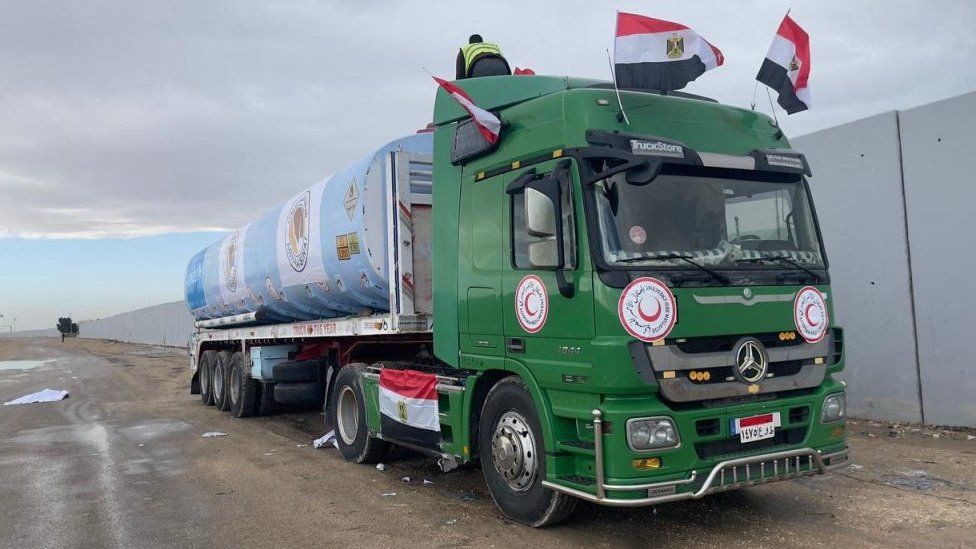Mobile phone and internet connections have reportedly been partially restored after a fuel delivery.
 Image source, –
Image source, –Israel says it will allow two fuel trucks a day to enter the Gaza Strip, after pressure to do so from the US.
A US State Department official says around 140,000 litres of fuel will be allowed in every two days.
Most of that is intended for trucks delivering aid, as well as supporting the UN in providing water and sanitation, the official said.
The rest is for mobile phone and internet services, which had been cut off due to a lack of fuel.
On Friday, the company which provides Gaza’s communications said that its services were returning after receiving some fuel via Unrwa, the UN’s agency for Palestinian refugees.
The US official said Washington exerted considerable pressure on Israel to push this fuel agreement through.
The deal had been agreed in principle weeks ago, the official added, but was delayed by Israel for two reasons. Israeli officials told the US that fuel had not actually run out in southern Gaza, and they also wanted to wait and see if they could negotiate a hostage deal first.
The head of Unrwa warned on Thursday that the agency may have to suspend all of its activities due to the lack of fuel.
In its latest situation report, the agency said it required “160,000 litres of fuel every day for basic humanitarian operations” – more than double what has been agreed.
Earlier, an Israeli official said the new fuel allowance would be brought in through the Rafah crossing to the civilian population in the southern Gaza Strip via the UN, provided that it does not reach Hamas.
The Israeli official said the fuel would give “minimal” support to water, sewage and sanitation systems, in order to prevent the outbreak of epidemics that could spread in the area.
International organisations have repeatedly expressed grave concerns over the humanitarian situation unfolding in the Gaza Strip.
The World Health Organization (WHO) has previously warned of “worrying trends” in the spread of disease in Gaza, where the lack of fuel and Israeli bombardment have severely disrupted the healthcare system and sanitation facilities.
On Friday, Richard Peeperkorn, the WHO’s representative in the Palestinian Territories, said that more than 70,000 cases of acute respiratory infections and over 44,000 cases of diarrhoea had been recorded, according to Reuters – figures significantly higher than expected.

More on Israel-Gaza war
- Follow live: Latest updates
- In Gaza: Lack of fuel causes blackout across Strip
- Reporting: BBC goes inside Al-Shifa hospital with the Israeli army
- Explained: The faces of hostages taken from Israel
- History behind the story: The Israel-Palestinian conflict

Fuel is needed in Gaza to run the enclave’s desalination plant, to provide electricity to homes and hospitals, and for sanitation, transport, and communications infrastructure.
It is also crucial for the delivery of aid around the territory.
Israel has been blocking fuel from entering Gaza, arguing that it could be stolen by Hamas and used for military purposes.
Before the latest war Israel provided the majority of Gaza’s electricity, and some was produced by the enclave’s sole power plant which is no longer functioning.
On Saturday in Gaza’s south, the director of Nasser hospital in Khan Younis said it had received the bodies of 26 people, and 23 others with serious injuries, after an air strike on a residential building in Hamad city.
The Israeli military has not yet commented on the report.
Meanwhile, the Red Crescent said at least five Palestinians were killed in an Israeli air strike on a building in the Balata refugee camp in the West Bank city of Nablus.
The Israeli army said it was checking on the reports.
US Secretary of State Antony Blinken has told Israel to take “urgent” action to “de-escalate tensions in the West Bank, including by confronting rising levels of settler extremist violence”.
The strike happened a day after Israeli military said it killed at least seven militants in two separate confrontations in the West Bank.
Israel’s latest siege and military operation began following Hamas’s brutal 7 October attack, when the group – which is banned as a terrorist organisation by the UK, US and other powers – killed around 1,200 people and took more than 230 people hostage, according to Israeli authorities.
At least 12,000 people have been killed in the territory since Israel began its retaliatory strikes, according to the Hamas-run health ministry in the Palestinian enclave.